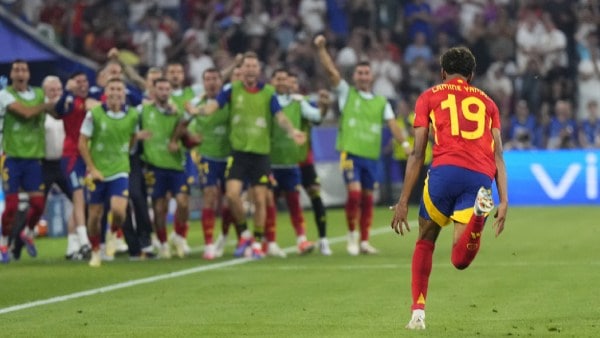THE MATCH clock, and the world around Lamine Yamal, stopped at 20:16 at the Allianz Arena in Munich. It was the precise moment when the wondrous strike from his left-instep curled and curved in its 20-yard journey, shook the iron post and nestled into the French nets, past the airborne shot-stopper Mike Maignan.
The goal stirred a famous comeback victory for Spain over France to enter the Euro Championship 2024 final, and would soar into the hall of fame of the greatest goals ever in the tournament, and adorn the wall of football tragic in the years to come.
The goal was remarkable on several layers, from his poise in front of a packed defence to snatch the ball, the vision in discovering the perfect path to goal amidst French shirts, the dexterity of his feet to trick his pre-match provocateur Adrien Rabiot and friends to one side, nudge the ball to the opposite side with a delicate touch of the out-step and the conviction to bend the ball beyond the goalkeeper from the distance.
But the most astonishing feature was that Yamal is only 16 — he turns 17 on Saturday. He is already the youngest to several feats — youngest to play for his club, FC Barcelona, and country, youngest goal-scorer for both, youngest assist-maker, youngest goal-scorer at Euros.
He looks younger. There is no trace of moustache; he bares the braces on his teeth when he smiles, he has packed textbooks so that he can prepare for the exams. The coach often substitutes him after the hour mark, lest he ends up paying a hefty fine as the German labour law prevents minors working after 8 pm. With the ball on his feet, though, he sends adults double his age this way and that, into a gorge of embarrassment.
But somewhere, he is still a child. Though he has been at Barcelona’s famous youth academy La Masia for a decade, he feels homesick. He talks to his parents Sheila, from Equatorial Guinea, and Mounir from Morocco, everyday. In the phone call before the match, his mother asked him what gift he wanted for his birthday. He replied: “You don’t need to buy me any present if we manage to win.” He gave himself a birthday present. A goal of unreal beauty.
In that moment, the face of his parents may have flashed in his mind. Childhood was not easy, his father had to borrow money from relatives and neighbours to buy boots and take him to football trials. During one such trial, he caught the eye of Barcelona scouts. Eight years later, he caught the attention of the legendary Xavi Hernandez, then Barcelona manager. He needed just 10 minutes of watching him practice to invite him for training with the senior team. And last season, he was fast-tracked to the first team.
But for years, he kept his mother’s scarf at his bedside. He carried it to the school and the pitch. Whenever there is a break, he rushes to his hometown, Rocafonda, a sleepy migrant-rich town with about 120,000 inhabitants, half-an-hour from Barcelona. He spends time with his parents and extended family. “I have 23 cousins, and we spend a lot of time at my uncle’s bakery. I belong there,” he once told GQ Spanish.
 Spain’s Lamine Yamal celebrates after scoring his side’s first goal during a semifinal match between Spain and France at the Euro 2024 soccer tournament in Munich, Germany, Tuesday, July 9, 2024. (AP Photo/Manu Fernandez)
Spain’s Lamine Yamal celebrates after scoring his side’s first goal during a semifinal match between Spain and France at the Euro 2024 soccer tournament in Munich, Germany, Tuesday, July 9, 2024. (AP Photo/Manu Fernandez)
The town is his identity. Whenever he scores a goal, he flashes the last three digits of the town’s post code 304. The number is printed on his boot too, beside the flags of Equatorial Guinea and Morocco. He has taken a slice of Rocafonda to Barcelona, and now Germany. Both worlds — the systematic football school and the chaotic, self-learning street academy — perfectly blend in him.
He has the mischief and eye for finding small spaces, he can wriggle through a cavalcade of markers and possesses a vast spread of tricks. “When you learn to play on the street, in the end you have more resources, because it is more street football, without so many rules, and that generates more mischief in you compared to someone who has trained in a school,” he had once said.
He has the technical finesse of a Barcelona academy product too. He has a splendid first touch, can control the ball with any muscle of his body, is selfless in passing the ball to his teammates, drops back for defensive duties, and his tackling and pressing near in his half were as important as his goal on Tuesday night.
The praises overflowed. “He is touched by God,” Spain coach Luis de la Fuente gushed. “His shot was magnifique,” France coach Didier Deschamps extolled. “Only a chosen one could perform this,” Rodri, his teammate, praised. Months ago, Xavi would say: “His decision-making is almost always right. That is the hardest thing in football.”
By virtue of his abundant gifts, the coincidence of a left-footed player on the right wing, and the Barcelona link, Yamal has been likened to Lionel Messi. Yamal himself has laughed off the comparison, and he is mature, beyond his years, to know that the road to greatness is long and winding. There are several tales of caution. The youngest goal-scorer before him — Johan Vonlanthen of Switzerland — is now a Seventh-Day Adventist priest. His vaunted senior Ansu Fati is struggling to settle into mid-table clubs.
But whether he fulfils his talents or not, Yamal has waltzed into the footballing consciousness of the world, stopping it when the game clock struck 20:16 in Berlin.








